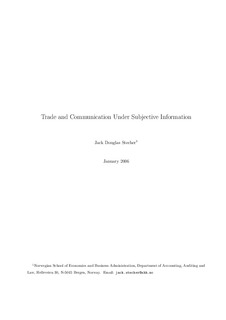| dc.contributor.author | Stecher, Jack Douglas | |
| dc.date.accessioned | 2006-07-11T10:20:08Z | |
| dc.date.available | 2006-07-11T10:20:08Z | |
| dc.date.issued | 2006-01 | |
| dc.identifier.issn | 1500-4066 | |
| dc.identifier.uri | http://hdl.handle.net/11250/163581 | |
| dc.description.abstract | This paper models an economy where agents perceive the choices they face subjectively, and have subjective interpretations of the terminology they use in a shared business language. Preferences are defined on what an agent perceives, and not on what is objectively presented to an agent. A business language enables agents to trade, provided the terminology in the language is sufficiently vague: once agents can express more detail than their trading partners can perceive, the language ceases to be useful. Under some regularity conditions on the language, an appropriately defined notion of competitive equilibrium exists. However, much less can be said about welfare than in the neoclassical case, as there are counter-examples to both welfare theorems. | en |
| dc.format.extent | 245826 bytes | |
| dc.format.mimetype | application/pdf | |
| dc.language.iso | eng | en |
| dc.publisher | Norwegian School of Economics and Business Administration. Department of Finance and Management Science | en |
| dc.relation.ispartofseries | Discussion paper | en |
| dc.relation.ispartofseries | 2006:2 | en |
| dc.subject | language | en |
| dc.subject | perceptual limits | en |
| dc.subject | unawareness | en |
| dc.title | Trade and communication under subjective information | en |
| dc.type | Working paper | en |
